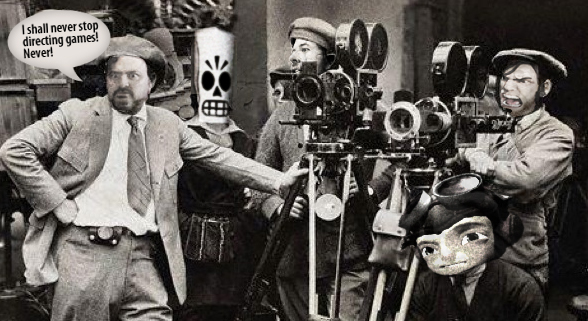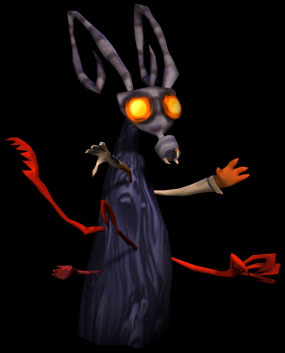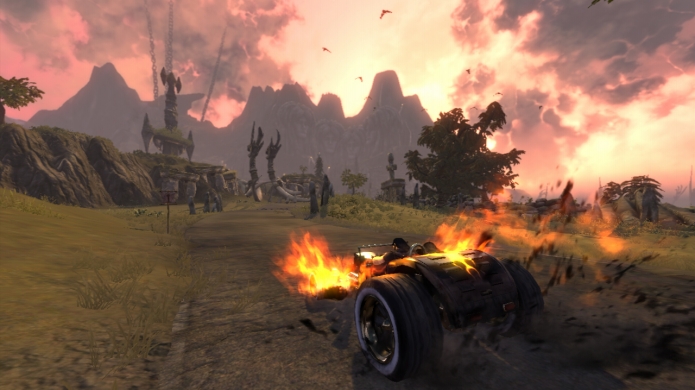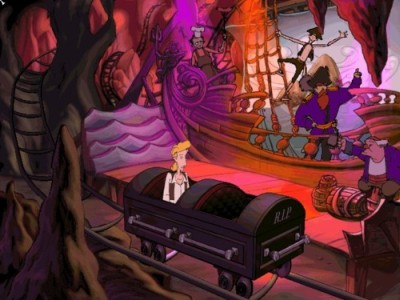Articles

Tim Schafer Should Never Stop Making Video Games Page Two
Riviello’s take on Psychonauts: “There isn’t a gamer alive that played the game and actually enjoyed the horrible platform mechanics.” Aside from the fact that he’s demonstrably wrong (Hi!), his opinion that the platforming is “horrible” makes one wonder just how many platformers this guy has played. Still, mounting a defense of the “enjoyability” of Psychonauts’ platforming mechanics would be missing the real point here, which is the fact that the gameplay is of integral importance to the game’s storytelling.
Psychonauts is in one sentence a platformer with the story focus of a classic adventure game. To believe the most cynical of its critics, it should have just been an adventure game and avoided the identity crisis. Riviello, I suppose, would have had it as a motion picture. But this ruling is mystifying, betraying an ignorance of what makes Psychonauts what it is. When Raz explores dreamscapes, he’s given a look into the characters’ psyche, background, and emotions. This stuff isn’t relegated to being conveyed through cutscenes or dialog alone, but through the very act of running and jumping through the levels. In the game’s finest moments, the exploration of the environments in and of itself is both gameplay and storytelling, and that alone justifies Psychonauts’ medium as the ideal one for its story to be told in. And anyway, conceptually Psychonauts couldn’t any more naturally lend itself to being a video game – the idea of a person’s mind being a level and their inner demon being a boss fight is just a cool conceit on the face of it.

A lot of game-specific constructs are ingeniously given story purpose in Psychonauts. Take the most basic collectible in the game, 2D figments scattered throughout a person’s mind which, when reviewed later at the player’s leisure, might fill in a blank or add a layer to a character’s personal story. This is a unique little expansion of a platforming convention which, significantly, cinema can’t exactly claim to have a counterpart for. In Black Velvetopia, when Raz hops down into the sewers of what is above the surface a Mexican town and splashes into an intentionally isolated area filled with incongruous high school imagery, we're being told a story about Edgar Teglee's personality and regrets, and in a way that's not only subtle, cool and engaging (because you get to literally navigate through it) but completely exclusive to the video game medium.
Is this not gameplay despite also being story? Is that unique blend of narrative depth and the more immediately satisfying, Mario-like mechanics not the underlying attraction that motivates critics to laud Psychonauts as such a special experience? Does the fact that I’d love to read a Psychonauts comic really deny the obviousness that Psychonauts was conceived and built from the ground up to be experienced with a controller in hand?
While not as story-driven as Psychonauts, there is a similar case to be made about the world of Brutal Legend. Schafer sought to bring the world of a heavy metal album cover to life, and game satisfied the need to jump into that world rather than merely look at it. The Age of Metal is lovingly textured not only with artistic detail but with rich mythos. Gems of extra detail glimmer from every corner of the game world, waiting for the player to exercise the option of mining it. To merely trek across the vast landscapes of the overworld is to imbibe backstory information, to be lovingly assaulted with invitations to give that monument visible off the designated path a closer look. That stop-and-smell-the-flowers aspect of any game with a particularly well-realized world makes that world seem alive in a way that only gamers can claim to have experienced because of its predication on participation and applied curiosity on your part.

It speaks to that basic, child-like hunger to explore the mysterious cave that inspired Miyamato to make Zelda, that desire to get off the Disneyland ride and actually visit the pirate town that led Ron Gilbert to make Monkey Island. So why in the heck would I want to remove the ability to explore the consistently incredible worlds of Schafer’s games, complete with the ability to go peek inside the nooks and crannies? A movie would not have allowed me to see what would happen if I performed Clairvoyance on a random character, or how someone will react if I tell them “No” when they want me to say “Yes,” or even if I just wanted to round that bend and get a glimpse of what a rock formation looks like on the other side.
There’s a troubling but very real phenomenon in effect in gaming critique where a game will practically be vilified for being too good or too caring in the area of story when it’s not in a context deemed couth. It is a liability for a game to feature storytelling strong enough to merit a comparison to film or literature if the gameplay mechanic doesn’t fall in with expectation – get your adventure game out of my platformer; the story isn’t supposed to be this emphasized! And of course this goes both ways, lest we forget how conservative adventure gamers can be when it comes to mixing up the gameplay, even when it is clearly character-relevant.

“I don’t want change” is the crux of many complaints against Schafer’s post-adventure projects once you get X by itself. But objectively the gameplay evolution that’s there to be observed is a fairly natural one, from Full Throttle’s willingness to streamline Day of the Tentacle’s interface and its incorporation of action scenes to appropriately depict a story about biker gangs. It is fair enough to love the classics so dearly that modern efforts don’t measure up in your mind, but if backwards thinking takes you to the extreme of wanting Tim Schafer to hang up his hat in the industry he’s become an icon of, I can't have your back. The power and the magic of games is that it removes the lap bars from the Disneyland ride, and the Audio-Animatronic sets of Tim’s log flumes are some of the most appealing ever constructed. If Alex Riviello truly believes what he says, he’d probably be content with a transcript of Grim Fandango. Me, I want to be able to keep climbing off the ride.
A ranty editorial by Jason, who was a much younger man when he started writing it.